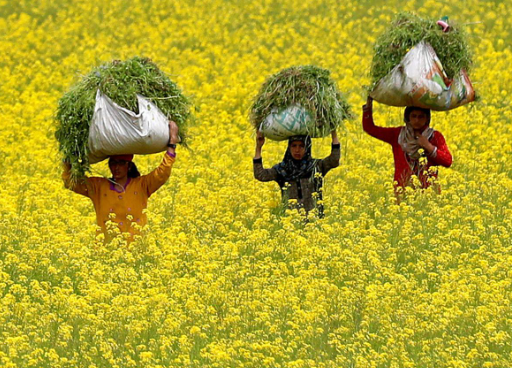SC Verdict on GM Mustard Approval (GS Paper 3, Biotechnology)

Introduction
- The Supreme Court (SC) recently delivered a split verdict on the validity of the Centre’s decision to grant conditional approval for the environmental release of Genetically Modified (GM) mustard crops.
- This decision, highlighting the ongoing debate around GM crops in India, will now be referred to a three-judge bench of the Supreme Court.
What are Genetically Modified (GM) Crops?
- Genetically Modified (GM) crops are plants whose genes are artificially altered to introduce new traits such as increased yield, herbicide resistance, disease resistance, or improved nutritional value.
- The genetic modifications often involve inserting genetic material from another organism.
Key Highlights of the SC Verdict on GM Mustard
Reason Behind Split Judgement:
- Justice Nagarathna's Critique: Justice Nagarathna criticised the Genetic Engineering Appraisal Committee (GEAC) for approving the GM mustard project without considering indigenous studies on the crop’s effects in India and relying solely on foreign research.
- Justice Karol's Support: Justice Karol upheld the GEAC’s clearance for GM mustard’s commercial release.
- Concurrence on Judicial Review: Both judges agreed on the permissibility of judicial review of GEAC's decisions and the necessity for a national policy on GM crops.
Directive for National Policy:
- The judges instructed the Union Ministry of Environment and Forest to develop a national policy on GM crops within four months.
- This policy should cover research, cultivation, trade, and commerce and be formulated in consultation with stakeholders, including agriculture experts, biotechnologists, state governments, and farmer representatives.
What is GM Mustard?
About:
- Dhara Mustard Hybrid-11 (DMH-11): Developed in India by hybridising the Indian mustard variety 'Varuna' with 'Early Heera-2' (Eastern European variety), DMH-11 contains two alien genes (‘barnase’ and ‘barstar’) from Bacillus amyloliquefaciens, enabling high-yielding mustard hybrids.
- Approval: The GEAC approved DMH-11 for cultivation in October 2022.
Characteristics:
- Herbicide Tolerance: GM mustard is engineered to withstand specific herbicides, aiding in weed control and enhancing crop yield.
Significance:
- Oil Production and Imports: Mustard contributes significantly to India's edible oil production, comprising 40% of the total. Despite producing 116.5 lakh tonnes of edible oils in 2021-22, India imported 141.93 lakh tonnes.
- Yield Enhancement: GM mustard shows a yield increase of approximately 28% over the national standard and surpasses zonal benchmarks by around 37%, with potential yields of 3-3.5 tonnes per hectare.
- Improved Input Efficiency: GM mustard optimises resource use, requiring less water, fertilisers, and pesticides compared to traditional varieties.
- Price Stability: Increased production through GM mustard can stabilise edible oil prices in the domestic market.
Challenges Faced by GM Crops
General Challenges:
- Biodiversity Concerns: Potential effects on honeybees and other beneficial insects, soil microbes, and wildlife.
- Food Security and Health: Risks of monoculture cropping, novel proteins with unknown health impacts, and vulnerability to crop diseases.
- Ethical Considerations: Issues around genetic resource commodification, agricultural sovereignty, and farmers' rights to save and exchange seeds.
- Regulatory Challenges: Ensuring compliance with bio-safety protocols and long-term environmental monitoring requires robust institutional capacity.
Specific Challenges with Bt Cotton:
- Insect Resistance: Emergence of insect resistance to Bt toxin.
- Secondary Pest Outbreaks: Increased populations of non-target pests like aphids and whiteflies.
- Environmental Impact: Effects on non-target organisms.
- Economic Implications: Debated long-term economic benefits and diminishing returns.
What is the Genetic Engineering Appraisal Committee (GEAC)?
- The GEAC, under the Ministry of Environment (MoEF&CC), appraises activities involving large-scale use of hazardous microorganisms and recombinants in research and industrial production from an environmental perspective.
- It also reviews proposals for the release of genetically engineered organisms and products into the environment, including experimental field trials.
- The committee is chaired by the Special Secretary/Additional Secretary of MoEF&CC and co-chaired by a representative from the Department of Biotechnology (DBT).
Way Forward
Biodiversity Mitigation:
- Conduct extensive research on ecological impacts.
- Implement adaptive management strategies.
Food Safety and Human Health:
- Assess allergenicity and toxicity of novel proteins.
- Invest in long-term studies on food security impacts.
Ethical Considerations:
- Ensure equitable access to GM technologies.
- Protect traditional farming practices and promote farmer autonomy.
Capacity Building:
- Strengthen regulatory capacity through training and enhanced facilities.
- Establish transparent frameworks incorporating public consultation and stakeholder engagement.
Conclusion
- The SC's split verdict on GM mustard approval underscores the complexities and contentious nature of GM crop adoption in India.
- While GM mustard offers potential benefits in terms of yield enhancement and resource efficiency, concerns around biodiversity, food security, and ethical issues must be carefully addressed.
- A comprehensive national policy, informed by extensive stakeholder consultation and robust regulatory frameworks, is essential for navigating the future of GM crops in India.


